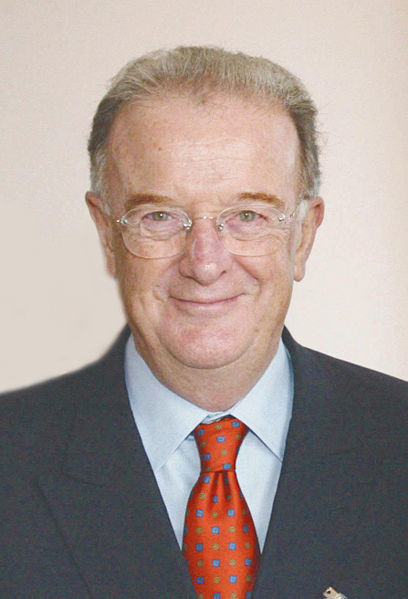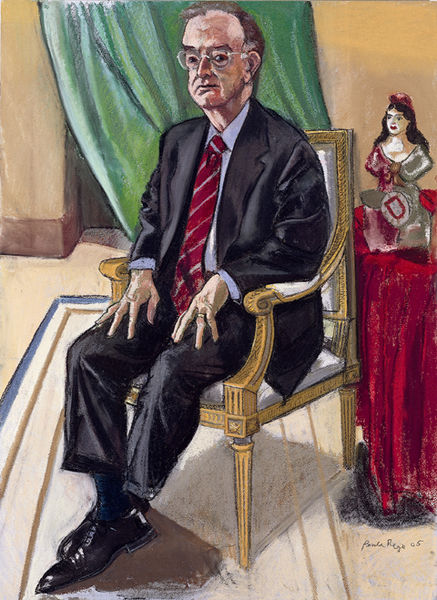<Back to Index>
- Philosopher Claudio Achillini, 1574
- Poet Tomás de Iriarte y Oropesa, 1750
- 18th President of Portugal Jorge Fernando Branco de Sampaio, 1939
PAGE SPONSOR


Jorge Fernando Branco de Sampaio, GColTE, GCIH, GColL is a Portuguese lawyer and politician who was the 18th President of Portugal from 1996 to 2006.
Sampaio was born in Lisbon on 18 September 1939. The Sampaio family lived abroad in the United States and the United Kingdom for some years, due to the professional activity of his father Arnaldo de Sampaio (1908 – 1984), a Medical Doctor. His mother was Fernanda Bensaúde Branco (1908 - Lisbon, 15 February 2000). His maternal grandmother Sara Bensliman Bensaúde, who died in 1976, was a of Sephardi Jew from Morocco of Portuguese origin, and his maternal grandfather Fernando Branco (1880 – 1940) was a Naval Officer of the Portuguese Navy and later the Foreign Minister of Portugal; Sampaio himself is agnostic, and does not consider himself a Jew. He started his political career as college student of the Faculty of Law of the University of Lisbon. Jorge Sampaio was involved in the student contestation against the fascist regime and was leader of the Lisbon students union between 1960 and 1961. Following his graduation in 1961, Jorge Sampaio started a notable career as a lawyer, often involved in the defence of many political prisoners.
His brother is the teenage - psychiatrist and writer Daniel Sampaio. He married firstly a medical doctor named Cavaco Silva, daughter of António Jorge Dias (Porto, 31 July 1907 - Lisbon, 5 February 1973) and wife German Margot Schmidt. The couple had no issue and later divorced. He married secondly Maria José Rodrigues Ritta (b. Lisbon, 19 December 1941), daughter of José António Ritta and wife Maria José Rodrigues Xavier and sister of Maria Ermelinda and José António, by whom he had two children: Vera Ritta de Sampaio (b. 1977) and André Ritta de Sampaio (b. 1981).
After the Carnation Revolution of 25 April 1974, Sampaio funded Movimento de Esquerda Socialista (MES) (Portuguese acronym for Socialist Left Movement) but abandoned the political project soon after. In 1978 he joined PS, the Socialist Party, where he remains to the present day. His first election as a deputy for Lisbon in the Portuguese National Parliament was in 1979. Between this year and 1984, he was a member of the European Commission for Human Rights,
where he developed important work on these topics. Between 1986 and
1987 he was president of the parliamentary bench of the Socialist
Party. In 1989, he was elected president of this political group, an
office he held until 1991. Also in 1989, Jorge Sampaio was elected the
62nd Mayor of Lisbon, office which he assumed in 1990, and re-elected in 1993, remaining in office until 1995. In 1995, Jorge Sampaio announced his wish to run for the presidency of the Republic. He won the election of 14 January 1996 in the first round against Aníbal Cavaco Silva, the former prime minister by then, and became president on 9 March. After a non controversial first mandate, he was re-elected as President on 14 January 2001. As
President, Sampaio's actions were focused on social and cultural
affairs. In the international political scene, he oversaw the return of Macau to China in December 1999 and he also gave important publicity to the cause of East Timor's independence. It
is generally considered that Sampaio's presidency were marked by a firm
sense of prudence and moderation, an approach which earned him a
remarkably uneventful first term in office. In 2004, however, his
refusal to hold early elections following Social Democrat Prime Minister José Manuel Durão Barroso's resignation met with vigorous protest from all left wing parties and even led to the stepping down of Socialist leader Eduardo Ferro Rodrigues.
Sampaio made this decision to ensure political stability at a time when
the country was facing economic recession, and he appointed Pedro Santana Lopes as
Prime Minister. However, only four months afterwards, on 30 November,
Sampaio concluded that the new cabinet was not achieving the desired
stability, but quite the opposite, and he therefore dissolved the
Parliament, calling new elections for February 2005. On 24 February 2005, Sampaio called on José Sócrates, as the nation's next prime minister, to form a government. Sampaio's successor was chosen in the presidential election held on 22 January 2006. Aníbal Cavaco Silva, the man he defeated in 1996, succeeded Sampaio on 9 March 2006. As a former President, Sampaio is a Member of the Portuguese Council of State. He is also a member of the Club of Madrid.
In May 2006, Sampaio was appointed by the United Nations Secretary - General as his first Special Envoy for the Global Plan to Stop Tuberculosis. In April 2007, current UN Secretary - General Ban Ki-moon designated him as High Representative for the Alliance of Civilizations. In 2008, he was awarded the North - South Prize of the Council of Europe. Other honors include Jerusalem
Post: I understand that you have Jewish ancestry in your family. What
is your personal connection to the Jewish people? Do you consider
yourself to be a Jew?. Jorge
Sampaio: My grandmother belonged to a Jewish family that came from
Morocco in the beginning of the 19th century. She married a non-Jewish
naval officer who later was Foreign Affairs minister. I am naturally
very proud of this ancestry and of all those that I call my "favorite
Jewish cousins," one of whom is the president of the Lisbon Jewish
Community, as I am proud of the ancestry on my non-Jewish father's
side. Personally, I am agnostic, and I do not consider myself a Jew;
but I am proud, as I said, of my ancestors.